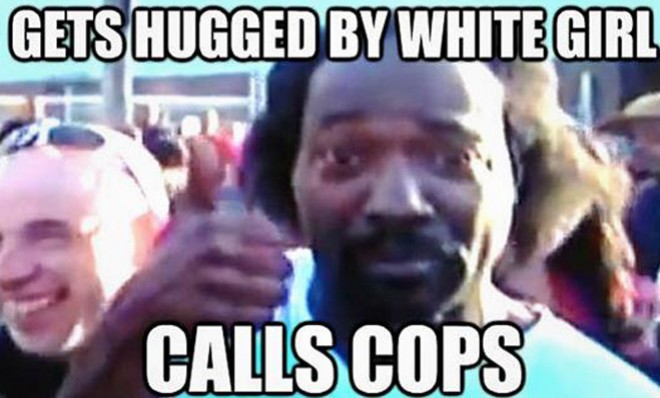The internet's instant meme-ification of Charles Ramsey: The backlash
Does a Cleveland man's dizzying ascent to viral stardom expose America's racist underbelly?


No sooner did America hear about the miraculous story of three long-missing women being freed from captivity in a Cleveland home did Charles Ramsey, the neighbor who reportedly aided in their escape, become an internet star.
Ramsey was one of the first to provide reporters with an eyewitness account of the rescue of Amanda Berry who, along with Georgina DeJesus and Michelle Knight, had been missing for a decade. (Read more about their rescue here.) Ramsey offered America a candid, self-effacing report that immediately caught the eye of thousands upon thousands of people all over the world. Like any good story, Ramsey peppered his tale with details ("I was eaten' my McDonald's") and offered a humorous analysis of an otherwise unbelievable situation: "Bro, I knew something was wrong when a little pretty white girl ran into a black man's arms. Something's wrong here. Dead giveaway."
Ramsey's ascent to internet stardom was dizzying. Before long, #CharlesRamsey was trending on Twitter. He was gif'd, spun into multiple memes, and his original interview was, of course, auto-tuned.
The Week
Escape your echo chamber. Get the facts behind the news, plus analysis from multiple perspectives.

Sign up for The Week's Free Newsletters
From our morning news briefing to a weekly Good News Newsletter, get the best of The Week delivered directly to your inbox.
From our morning news briefing to a weekly Good News Newsletter, get the best of The Week delivered directly to your inbox.
"What's really getting everyone's attention isn't his intervention in saving the women's lives," says Roger Ratchet at Gossip On This, "it's his wide-eyed, tactless, and ebonics-peppered speech that has everyone in stitches."
Ramsey is not the first black American to be thrust suddenly into the spotlight this way. Remember Antoine Dodson of "Hide Your Kids, Hide Your Wife" or Sweet Brown of "Aint Nobody Got Time for That"? They also gave equally frank local TV interviews that were manipulated, memed, catch-phrased, and forwarded around for entertainment.
In the eyes of many critics of these memes, the common denominator among Ramsey, Dodson, and Sweet Brown is that they are poor and black. And to some, this kind of meme-ification reveals America's racist underbelly. "Laughter directed at people like Sweet Brown plays into the most basic stereotyping of blacks as simple-minded ramblers living in the 'ghetto,' says Aisha Harris at Slate. The root of such jokes are "disrespectful at best." Harris continues:
It's difficult to watch these videos and not sense that their popularity has something to do with a persistent, if unconscious, desire to see black people perform. [Slate]
Indeed, Ramsey's race and class are central to his temporary celebrity, says Gene Demby at NPR. And these memes are patronizing. Demby continues:
A free daily email with the biggest news stories of the day – and the best features from TheWeek.com
Amid the hood backdrop — the gnarled teeth, the dirty white tee, the slang, the shout-out to McDonald's — we miss the fact that Charles Ramsey is perfectly lucid and intelligent. [NPR]
But perhaps the root problem isn't the internet's potential racism, says Jason Parham at Complex, it's the internet itself. The web has become a machine that churns out nuggets of meaningless morsels that are disposed of just as quickly as they are consumed. The real issue is "our sick need to parody, to make light of moments that should matter, moments that should carry much more weight that we ascribe them," Parham says. "The sad reality of today's news: The escape of Berry, DeJesus, and Knight has become a minor talking point to Ramsey's growing celebrity."
Lauren Hansen produces The Week’s podcasts and videos and edits the photo blog, Captured. She also manages the production of the magazine's iPad app. A graduate of Kenyon College and Northwestern University, she previously worked at the BBC and Frontline. She knows a thing or two about pretty pictures and cute puppies, both of which she tweets about @mylaurenhansen.
-
 Le Pen back in the dock: the trial that’s shaking France
Le Pen back in the dock: the trial that’s shaking FranceIn the Spotlight Appealing her four-year conviction for embezzlement, the Rassemblement National leader faces an uncertain political future, whatever the result
-
 The doctors’ strikes
The doctors’ strikesThe Explainer Resident doctors working for NHS England are currently voting on whether to go out on strike again this year
-
 5 chilling cartoons about increasing ICE aggression
5 chilling cartoons about increasing ICE aggressionCartoons Artists take on respect for the law, the Fourth Amendment, and more
